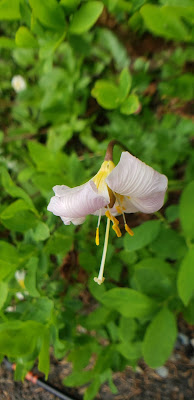My friend Sue sat at the foot of two giants, awestruck in Ohanapecosh, a native name that means “standing at the edge of place.” The two trees are on an island in the Ohanapecosh River at the foot of Mt. Rainier. Outside Mt. Rainier National Park, the world seems to be standing at the edge of another place—one that is too hot, too racially divided, too contentious. A few days in the National Park in the shade under a canopy of trees and a person could acquire an optimism that humanity will step back from the edges of our catastrophes.
Cross a swinging bridge built for one or maybe two people and one enters the Ohanapecosh Grove of the Patriarchs. The limits of the bridge require the give and take of those wishing to cross. The courtesy was extended with laughter and grace again and again.
Walking on the trails of the National Park, Sue and I passed people from every continent—a diversity of races, ages, and languages. There were people from India, Japan, China, the Middle East and Europe. We spoke to women of African descent—elderly and young—at a time when being outside in nature and Black in America can be hazardous. We spoke to a dad pushing his disabled son in a wheelchair. He was the one who called our attention to the few orange lilies.
Lilies were everywhere. A ranching family with a patriarch, who loved photography, stood with us by a hillside of white lilies. His kids and wife extolled the virtues of raising kids outside on the farm, instilling in them a love of nature and yet regretting not being able to pass the farm along to the next generation. It was an easy exchange away from the western conflicts between ranchers and farmers and us city folks. We talked, appreciating our collective joy of lilies, of camera lenses, and of family and of work.
It was as though we stood on the edge of possibilities, on the edge of what humanity could be and do.
The flowers were astonishing this year. The lilies alone were lovely at every stage of their blooming.


The white globe before its opening, the dancing of the full petals in the breezes, and the lilies’ fading stage, a lovely, muted pink. Humanity’s many colors, like those of flowers should be a source of delight. Would that the world would appreciate skin tones like the colors of petals. Nowhere on the park trails did I hear anyone deriding the pink of the heather or the purple of the asters. Everyone commented on their beauty.
There was an impressive generosity in shared information among the assembled park guests: the names of flowers, of a glacier, or a waterfall, a trail. The distance to a point ahead, the directions to a campsite, the sharing of guidebooks and binoculars. The name of a marmot. When people consult respectfully, they gather information. In the park people shared information freely. This willingness to listen or share facts is so often missing in the other place, the place on the edge of catastrophes.
When Sue sat on the ground to admire the two Patriarch trees, a man sitting on a bench in back of her called out that he and his son would share the bench with her—she didn’t need to sit on the ground he said. Laughing, Sue explained that she just wanted the lowest perspective possible, better with which to take a photo. When she got up she joined the father and his son as they sat eating on the bench. Alex and Locke were from Maryland, traveling west to explore Mt. Rainier, the Olympic Peninsula, and the Redwoods. Sue, an oceanographer, began explaining the beach formations on the Olympic Peninsula when Locke, the son, spoke up that he was hoping to become a geologist. As we talked it was apparent he already had an impressive knowledge of the field. We must have talked for almost a half an hour before parting ways. With Sue’s background in science and mine in education, we were both delighted to meet an up-and-coming scientist and an involved dad.
On the edge of this place, the enthusiasm of a young man was like a shaft of light filtering from the outside world. If humanity is to face the crisis on the horizon, the next generation needs articulate, thoughtful, and well-schooled leaders—science based, informed.
By the time Sue and I arrived at Paradise Lodge further up the road, we both had expressed our regret that we had not gotten contact information from the dad and his son. Later that afternoon we arrived back at our campground, but before Sue and I turned into our campsite loop we stopped at the message board to remove a note we had posted earlier for a friend passing through. To our confusion and then surprise, a second note had been attached to ours. The note read, “For Sue and Kathy — If you met a father and son from Maryland, this is for you. We enjoyed talking with you! If you wanted to send any more geological cool advice, we are at E18. Also email…, Alex and Locke.”
Sue and I will surely return for another camping trip to Mt. Rainier: to the litter-free trails, the clear river waters, to the respectful quiet of the park's crowded campground, and to the potential for making friends in a place on the edge of civility and hope.
Until next time Mt. Rainier.
(To follow future posts, sign up with your email.)










No comments:
Post a Comment
Please leave comments. They are most welcome.